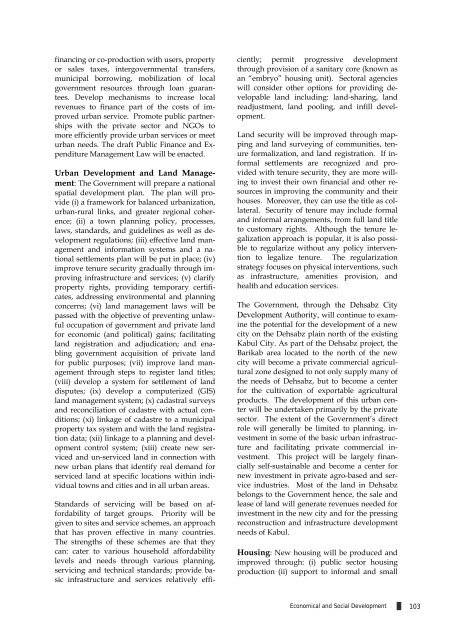Islamic Republic of Afghanistan - Enhanced Integrated Framework ...
Islamic Republic of Afghanistan - Enhanced Integrated Framework ...
Islamic Republic of Afghanistan - Enhanced Integrated Framework ...
You also want an ePaper? Increase the reach of your titles
YUMPU automatically turns print PDFs into web optimized ePapers that Google loves.
financing or co-production with users, propertyor sales taxes, intergovernmental transfers,municipal borrowing, mobilization <strong>of</strong> localgovernment resources through loan guarantees.Develop mechanisms to increase localrevenues to finance part <strong>of</strong> the costs <strong>of</strong> improvedurban service. Promote public partnershipswith the private sector and NGOs tomore efficiently provide urban services or meeturban needs. The draft Public Finance and ExpenditureManagement Law will be enacted.Urban Development and Land Management:The Government will prepare a nationalspatial development plan. The plan will provide(i) a framework for balanced urbanization,urban-rural links, and greater regional coherence;(ii) a town planning policy, processes,laws, standards, and guidelines as well as developmentregulations; (iii) effective land managementand information systems and a nationalsettlements plan will be put in place; (iv)improve tenure security gradually through improvinginfrastructure and services; (v) clarifyproperty rights, providing temporary certificates,addressing environmental and planningconcerns; (vi) land management laws will bepassed with the objective <strong>of</strong> preventing unlawfuloccupation <strong>of</strong> government and private landfor economic (and political) gains; facilitatingland registration and adjudication; and enablinggovernment acquisition <strong>of</strong> private landfor public purposes; (vii) improve land managementthrough steps to register land titles;(viii) develop a system for settlement <strong>of</strong> landdisputes; (ix) develop a computerized (GIS)land management system; (x) cadastral surveysand reconciliation <strong>of</strong> cadastre with actual conditions;(xi) linkage <strong>of</strong> cadastre to a municipalproperty tax system and with the land registrationdata; (xii) linkage to a planning and developmentcontrol system; (xiii) create new servicedand un-serviced land in connection withnew urban plans that identify real demand forserviced land at specific locations within individualtowns and cities and in all urban areas.Standards <strong>of</strong> servicing will be based on affordability<strong>of</strong> target groups. Priority will begiven to sites and service schemes, an approachthat has proven effective in many countries.The strengths <strong>of</strong> these schemes are that theycan: cater to various household affordabilitylevels and needs through various planning,servicing and technical standards; provide basicinfrastructure and services relatively efficiently;permit progressive developmentthrough provision <strong>of</strong> a sanitary core (known asan “embryo” housing unit). Sectoral agencieswill consider other options for providing developableland including: land-sharing, landreadjustment, land pooling, and infill development.Land security will be improved through mappingand land surveying <strong>of</strong> communities, tenureformalization, and land registration. If informalsettlements are recognized and providedwith tenure security, they are more willingto invest their own financial and other resourcesin improving the community and theirhouses. Moreover, they can use the title as collateral.Security <strong>of</strong> tenure may include formaland informal arrangements, from full land titleto customary rights. Although the tenure legalizationapproach is popular, it is also possibleto regularize without any policy interventionto legalize tenure. The regularizationstrategy focuses on physical interventions, suchas infrastructure, amenities provision, andhealth and education services.The Government, through the Dehsabz CityDevelopment Authority, will continue to examinethe potential for the development <strong>of</strong> a newcity on the Dehsabz plain north <strong>of</strong> the existingKabul City. As part <strong>of</strong> the Dehsabz project, theBarikab area located to the north <strong>of</strong> the newcity will become a private commercial agriculturalzone designed to not only supply many <strong>of</strong>the needs <strong>of</strong> Dehsabz, but to become a centerfor the cultivation <strong>of</strong> exportable agriculturalproducts. The development <strong>of</strong> this urban centerwill be undertaken primarily by the privatesector. The extent <strong>of</strong> the Government’s directrole will generally be limited to planning, investmentin some <strong>of</strong> the basic urban infrastructureand facilitating private commercial investment.This project will be largely financiallyself-sustainable and become a center fornew investment in private agro-based and serviceindustries. Most <strong>of</strong> the land in Dehsabzbelongs to the Government hence, the sale andlease <strong>of</strong> land will generate revenues needed forinvestment in the new city and for the pressingreconstruction and infrastructure developmentneeds <strong>of</strong> Kabul.Housing: New housing will be produced andimproved through: (i) public sector housingproduction (ii) support to informal and smallEconomical and Social Development 103
















